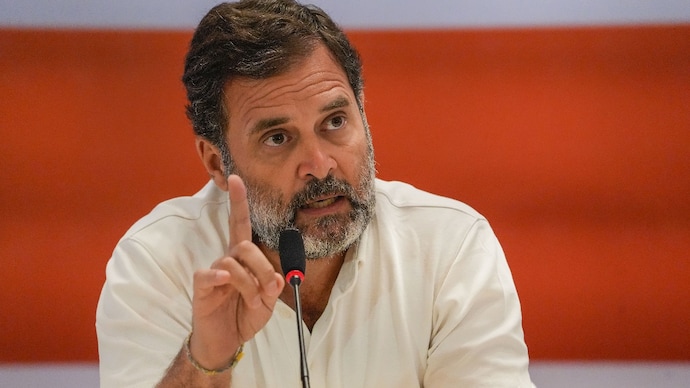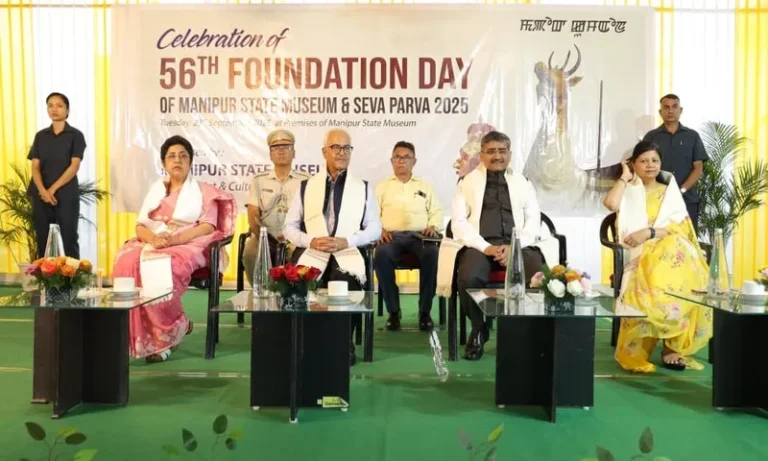Rahul Gandhi Criticizes BJP, Claims They Are Dividing India on Religious Lines
Summary
In a recent speech in Jharkhand, Congress leader Rahul Gandhi accused the BJP of inciting violence in Manipur and attempting to divide India along religious lines. He described BJP’s political approach as a threat to the unity of various religious communities in India, asserting that this strategy benefits their electoral goals. Gandhi reaffirmed his commitment to national unity and emphasized his opposition to the BJP’s policies.
Full Article
Introduction: A Divisive Political Landscape
As India approaches another election cycle, political tensions continue to rise, with leading parties critiquing one another’s strategies and policies. At the heart of recent criticisms stands Rahul Gandhi, the Congress Party leader, who has accused the ruling Bharatiya Janata Party (BJP) of fanning communal flames and causing unrest in Manipur. According to Gandhi, the BJP has sought to exploit religious differences, using this approach to secure political advantage and marginalize key groups within society.
Gandhi’s statements come amidst heightened communal tensions in several regions across India, notably in Manipur, where ethnic strife has had a profound impact on local communities. In his speech, Gandhi not only highlighted these issues but also pointed out specific BJP policies he believes are undermining India’s secular foundations.
Rahul Gandhi’s Accusations: Division Along Religious Lines
In his speech, Rahul Gandhi argued that the BJP has systematically used divisive rhetoric and actions to widen gaps between India’s diverse religious communities. He suggested that BJP leaders have been vocal in creating “us vs. them” narratives, often framing Hindu communities against Muslim, Sikh, and Christian groups. This, according to Gandhi, represents an intentional effort to polarize the population and ultimately secure a stronger voter base within certain religious groups.
Gandhi referenced his recent “Bharat Jodo Yatra” (Unite India March) as a direct counter to the BJP’s divisive strategy. He emphasized that this nationwide walk was designed to bring Indians of all backgrounds together, advocating for communal harmony and a collective Indian identity over individual religious identities. Through this journey, he claimed, he witnessed the strength of India’s unity and was further encouraged to combat divisive forces.
Impacts of BJP’s Alleged Policies on Manipur
Manipur has been one of the most discussed regions in relation to Gandhi’s comments. In recent months, the state has experienced a rise in ethnic violence, which many believe has been exacerbated by political undercurrents. Gandhi pointed out that BJP’s policies and alleged favoritism towards certain groups within Manipur have stoked resentment and contributed to the worsening situation. Gandhi argued that BJP’s involvement in Manipur is part of a larger, dangerous trend that undermines the interests of India’s northeastern states, which often feel sidelined in national policy decisions.
The BJP’s purported influence over local governance in Manipur, according to Gandhi, has led to a combustible atmosphere where ethnic and religious differences are heightened. He claimed that BJP’s actions have created a “burning” Manipur, using its policies as fuel for the unrest that has already displaced many and disrupted the social structure within the state.
Economic Disparities and Social Divisions
Gandhi also pointed out the economic consequences of BJP’s alleged divisive approach, focusing on how it impacts marginalized communities, including tribals and Dalits. He expressed concern that the BJP-led government has implemented policies that favor wealthy corporations and private interests while neglecting the needs of the poor and socially disadvantaged.
In his speech, he accused the BJP of granting massive loan waivers to large companies and elite individuals, often at the expense of supporting small farmers and rural communities. For instance, he highlighted that farmers in Jharkhand, particularly those from Dalit and tribal backgrounds, have seen limited support from the central government, even as corporations benefit from government leniency.
Gandhi’s Vision for a Unified India
Rahul Gandhi concluded his speech with a renewed call for unity, advocating for an India that celebrates its diversity rather than allowing it to become a point of division. Gandhi’s message emphasizes the need to counter divisive politics with grassroots movements that foster solidarity among all religious and ethnic groups.
For Gandhi, maintaining unity is a collective responsibility. He argued that a strong, united India could resist both internal and external threats, presenting the Congress Party’s approach as one that embraces diversity without weaponizing it. His vision seeks to restore what he views as India’s commitment to secularism and tolerance, principles enshrined in the nation’s founding documents.
Political Context and Upcoming Elections
Gandhi’s remarks have taken on increased significance as they come ahead of Jharkhand’s assembly elections, where Congress is actively campaigning. With voting scheduled across multiple phases in November, both Congress and BJP have ramped up their outreach efforts to secure support from various constituencies. Gandhi’s critique of BJP’s methods is seen as a cornerstone of the Congress campaign strategy, aiming to appeal to voters who are concerned about communal harmony and economic justice.
For many voters, the upcoming elections serve as a crucial moment to reflect on the direction India’s politics are heading. Gandhi’s speech highlights a sharp contrast between Congress’s message of inclusion and BJP’s alleged focus on consolidating power through divisive tactics.
Conclusion: A Call to Counter Divisive Politics
As India faces pivotal elections in several states, the clash between Congress and BJP exemplifies the broader ideological conflict shaping Indian democracy. Rahul Gandhi’s accusations against BJP underscore a fundamental debate over India’s identity, unity, and social fabric. In his view, Congress’s role is to preserve India’s secular traditions, combat economic inequality, and promote harmony among all its citizens.
While opinions on both sides remain polarized, the upcoming elections may determine which vision resonates most with the Indian people.
FAQs
- What did Rahul Gandhi accuse BJP of in his speech?
- Rahul Gandhi claimed that the BJP instigated communal tensions and attempted to divide India on religious lines to benefit politically.
- How does Gandhi view the situation in Manipur?
- He believes BJP’s policies have exacerbated ethnic violence, leading to ongoing social and political unrest in the region.
- What is Bharat Jodo Yatra?
- Bharat Jodo Yatra, or the Unite India March, is Gandhi’s nationwide campaign aimed at promoting communal harmony and countering divisive politics.
- How does Gandhi differentiate Congress’s approach from BJP’s?
- Gandhi argues that Congress promotes unity and secularism, while BJP fosters division for electoral gain.
- What issues are being prioritized by Congress in the Jharkhand elections?
- Congress emphasizes economic justice, support for marginalized communities, and communal harmony.



